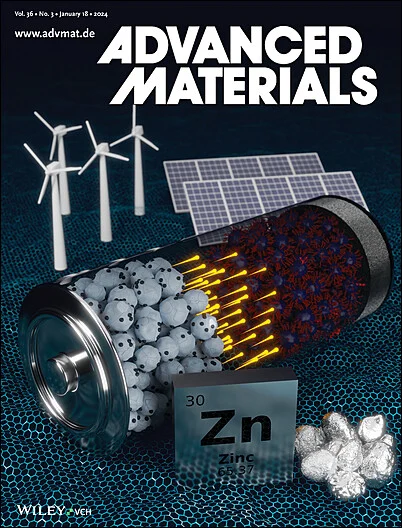肿瘤源性抗原和STING激动剂的个性化疫苗接种用于特异性癌症免疫治疗
IF 26.8
1区 材料科学
Q1 CHEMISTRY, MULTIDISCIPLINARY
引用次数: 0
摘要
个性化疫苗已经在癌症免疫治疗中显示出其前景,而个性化抗原的筛选仍然具有挑战性。本文报道了一种通过自身机制治疗肿瘤的个性化免疫治疗策略,该策略通过水凝胶整合肿瘤来源抗原的递送和STING信号激活来实现。制备了由没食子酸、锰离子和米托蒽醌组成的自组装纳米颗粒,在体外诱导肿瘤细胞的免疫原性死亡,以释放损伤相关的分子模式和自身抗原。海藻酸钠与释放的抗原和STING激动剂(即MSA‐2)结合后,可在体内瞬间与内源性钙离子交联,皮下注射后形成水凝胶。水凝胶允许控制自身肿瘤抗原和激动剂的释放,通过促进树突状细胞的成熟和诱导肿瘤浸润细胞毒性T淋巴细胞来激活特异性抗肿瘤免疫反应。因此,水凝胶疫苗的原位形成可以阻止同源肿瘤的进展并抑制转移性肿瘤的生长。这项工作概述了一种简单而普遍的个性化疫苗接种策略,以增强癌症免疫治疗。本文章由计算机程序翻译,如有差异,请以英文原文为准。
Personalized Vaccination of Tumor‐Derived Antigens and STING Agonists for Specific Cancer Immunotherapy
Personalized vaccines have shown their promise in cancer immunotherapy, while screening of personalized antigens remains challenging. Herein, a personalized immunotherapy strategy to treat tumors by its own mechanism is reported, which is achieved through the hydrogel‐integrated delivery of tumor‐derived antigens and STING signaling activation. Self‐assembled nanoparticles composed of gallic acid, manganese ions, and mitoxantrone are prepared to induce immunogenic cell death of tumor cells in vitro to release damage‐associated molecular patterns and autologous antigens. Sodium alginate integrated with the released antigens and STING agonists (i.e., MSA‐2) can be instantaneously cross‐linked with endogenous calcium ions in vivo to form hydrogels upon subcutaneous injection. The hydrogels allow for the controlled release of autologous tumor antigens and agonists to activate specific anti‐tumor immune responses via promotion of the maturation of dendritic cells and elicitation of tumor infiltration of cytotoxic T lymphocytes. As a result, the in‐situ formation of hydrogel‐based vaccines can prevent homologous tumor progression and inhibit metastatic tumor growth. This work outlines a straightforward and generalized strategy for personalized vaccination to enhance cancer immunotherapy.
求助全文
通过发布文献求助,成功后即可免费获取论文全文。
去求助
来源期刊

Advanced Materials
工程技术-材料科学:综合
CiteScore
43.00
自引率
4.10%
发文量
2182
审稿时长
2 months
期刊介绍:
Advanced Materials, one of the world's most prestigious journals and the foundation of the Advanced portfolio, is the home of choice for best-in-class materials science for more than 30 years. Following this fast-growing and interdisciplinary field, we are considering and publishing the most important discoveries on any and all materials from materials scientists, chemists, physicists, engineers as well as health and life scientists and bringing you the latest results and trends in modern materials-related research every week.
 求助内容:
求助内容: 应助结果提醒方式:
应助结果提醒方式:


